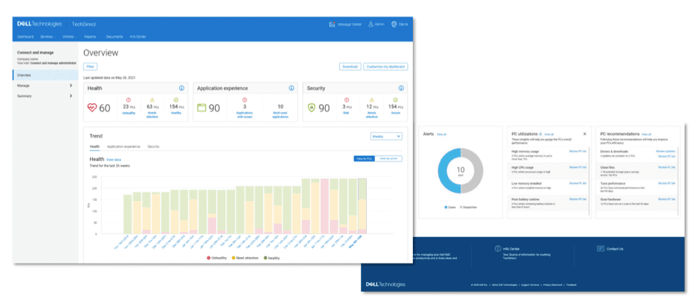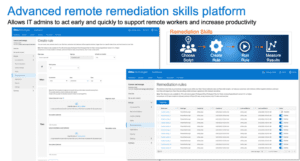The enterprise landscape is constantly evolving. While many of the significant shifts we’ve seen over the last few years were already underway (e.g., hybrid infrastructure, work-from-anywhere, everything-as-a-service, etc.), the lingering pandemic has accelerated the pace of transformation.
These operational changes bring a need for IT flexibility, the latest in proactive cybersecurity and the ability to support employees, wherever they are, as they adapt to these evolving work models and technologies. Supporting employees remotely is incredibly challenging as there’s no “IT-person” around the corner to meet with face to face.
Dell Technologies’ ProSupport Suite for PCs seeks to address these changing needs with a new array of customizable tech support tools for managing Dell PCs. Initially launched in 2015, the offering initially intrigued me with its unique, enterprise-class approach to client device tech support.
Since then, the offering has only become more compelling as Dell continues to blur the lines between traditional manual tech support (24/7 in-region support, onsite service, accidental damage coverage, etc.) and the managed services model it is driving in the enterprise.
Last week Dell announced a handful of new ProSupport Suite enhancements, promising to elevate the offering even further. Along with new intelligent support and remediation capabilities, Dell also revealed several new endpoint security features (which I will touch on briefly after digging into the ProSupport news). Does it live up to the promise? Let’s dive in.
Tech support, without the frustration
I believe the ultimate goal for any next generation support should be to provide a genuinely self-healing PC experience in which devices are remotely and intelligently managed, monitored and supported. Ideally, technical problems would be detected and resolved before the end-user even becomes aware of them—a far cry from the common, frustrating tech support experiences we’ve all encountered. Dell says this is their vision, too.
Employees and IT professionals alike are chafing at the new IT friction presented by remote work. Workers need to be able to access the right applications, entitlements and data, whether they’re in the office building or at home. Resolving IT issues was often an exercise in frustration when you worked in the same building as your IT department, let alone now when you’re sitting on hold from your home trying to regain access to the company network.
Meanwhile, your friendly IT person is pulling their hair out trying to protect the organization from new attack vectors and to figure out a manageable, reliable hybrid business transformation. All of this to say that employees and the IT departments whose job it is to support them are under immense amounts of pressure. This new round of updates pushes the ProSupport Suite further towards a self-healing IT experience—more intelligent, self-sufficient and proactive—that should do much to relieve headaches all around.
Crucial to this evolution is the platform’s new custom rules engine and the granular levels of control and automation it enables. IT admins can create and implement custom remediation rules to take fast and early action on support matters. Additionally, the engine allows customers to define parameters around the cloud creation and deployment of update catalogs. Custom rules establish when and how an organization’s fleet of Dell PCs (and its BIOS, drivers, firmware and apps) should be optimized and updated.
Furthermore, leveraging SupportAssist in TechDirect, IT admins can group and manage who gets these updates. Whether you’re seeking to deploy an update across your entire Dell PC fleet or to one specific device, I believe ProSupport Plus makes the process look easy and intuitive. I haven’t actually used the service but the claims are spot-on.
ProSupport Suite will also now provide customers a single screen dashboard view of their Dell fleet’s health, application experience, and security scores (according to Dell, the only support service to include all three scores in one place).
This quick view gives customers insight into any developing issues or performance trends that require action or remediation. Additionally, ProSupport Suite leverages AI software and utilization metrics to provide admins with tailored recommendations for action. Dell also announced full channel partner access to the Suite’s full array of AI-powered tools, support and portal described above.
Securing endpoints everywhere
Dell also unveiled updates to its Dell Trusted Devices security portfolio. Any comprehensive security strategy must take the supply chain into account. Advanced Secure Component Verification for PCs helps customers verify that their Dell commercial PCs and components arrive precisely as ordered. This feature is now available to Dell’s US federal customers and on other select systems.
Also introduced was Intel Management Engine (ME) Verification, a capability that validates system firmware and looks for evidence of tampering. The feature promises to provide layers of added protection below the operating system. Its initial release, available today in North America, Europe and the APJ region, focuses on critical, security-oriented boot processes.
The last new security feature, also available in North America, Europe and APJ, is Dell Trusted Device Security Information and Event Management, or SIEM. SIEM promises to give customers complete visibility into security incidents below the OS via their Splunk dashboards. This increased visibility, according to Dell, will allow for a more comprehensive analysis of an organization’s security status and help customers optimize the value of their existing investments in cybersecurity.
Wrapping up
The future of PC support is autonomous and self-healing and this is on a ten year trajectory. I think we’re halfway there. Dell’s latest ProSupport Suite for PCs is getting us there as a support offering that goes above and beyond the basics.
The new levels of intelligence, automation and security gained from the recent updates push the ProSupport Suite even closer to my and Dell’s vision of a truly self-healing PC experience. The platform’s custom rules engine could be a game-changer that I believe will ultimately make autonomous a reality. I’ll be watching with interest.

